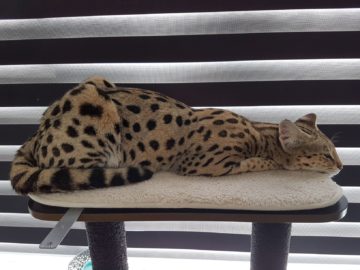Don’t buy a Savannah on impulse.
Think about it for at least a few days and talk about it with your family!
If possible, prepare a nice, not-too-small, room especially for your cat.
When you want a break from your loving, but busy cat friend, at night or when you are cooking, you can leave the cat in there. Cat shelves on the wall of your in your living room are also very appreciated by cats.
 Don’t buy easily destroyed cat toys.
Don’t buy easily destroyed cat toys.
In my experience Savannahs ruin cat toys much faster than ordinary cats. A strong playing rod is ideal, particularly if children want to play with a Savannah. A plastic ball cricuit is good, and small tennis balls.
Don’t give away your own food.
When you are preparing your own food and your cat approaches you meowing to have some, don’t give it any whilst cooking or eating. You don’t want to stimulate whining behaviour. Preferably I feed the cats first, before I cook and eat myself.
Don’t let the cat play with your hands.
This may look sweet with a kitten, but when an adult cat bites or scratches, it is not pleasant. From the start a cat needs to learn to play only with toys, not hands.
Buying from a trustworthy and reliable breeder
Beware of people who sell Savannahs at relatively low prices.
When this is the case, very often, there is a good reason. You might be dealing with a scammer, or someone who breeds Savannahs under bad conditions (small cages or whatever), has sick animals or unsocialized (read: wild) kittens.
Always be alert.
If possible, visit the breeder before buying a kitten, even if it involves a long journey. If this is not possible, take a close look at the background of the breeder’s pictures. Does the enviroment of the cats look good and clean? Also be alert if you only see beautiful set-up pictures of the cats in a room where it is not presumable for energetic naughty cats to live in (like delicate decorations).
Look at the conditions at the breeder’s premises.
- Do the cats have enough space? Do the high generation Savannahs have an outside run? Have a good look at the stud areas; are they kept in small and dirty cages without sunlight?
- Does everything seem hygienic? (Unneutered males mark their territory with urine so that does smell bad, but apart from that the areas need to be clean)
- Are the kittens anxious or do they approach you carefully, but curiously?
- Are you able to see the parents of the kittens? (Although it is possible that the mothercat does not want visitors to take a look at her kittens so she will need to be separated from them while you are visiting your kitten, that is normal)
- How do the adult cats react on the breeder? Can the breeder pet them or pick them up or is contact avoided? (It is not unusual for older cats to be frightened of visitors or be angry with them when you are dealing with high generation Savannahs, but they should have a good relationship with the breeder) When the breeder makes no contact with the cats, don’t be shy to ask if he can demonstrate to pet his cats.
- Can the breeder show you the family tree of the parents of the kitten you are going to buy?
- Can the breeder show you the health test results of the kitten’s parents? Important diseases are Fiv, Felv, PK-Def, HCM and PRA.
- Does the kitten have up-to-date vaccination papers?
- Does the kitten look healthy? (clean nose, ears and eyes, shiny fur, energetic?)
Ask other breeders if they know the breeder you have selected. TICA has a list of Savannah breeders. Ask the opinion of more than one cattery to get a good overview. Breeders are competitors and gossip about each other a lot. Try to filter out the information you find important, and, proof when they talk badly about another breeder. On the Facebook pages of catteries, you may find reviews as well.

